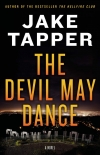The Devil May Dance, Tapper, Jake [e reading malayalam books TXT] 📗

Book online «The Devil May Dance, Tapper, Jake [e reading malayalam books TXT] 📗». Author Tapper, Jake
Back in the car, Sheryl Ann directed Margaret to their destination as best she could figure it out: Sunset to Highland to Hollywood Boulevard to Beachwood Drive. The fancy homes they whizzed by came in four styles: Spanish, Mediterranean, French Normandy, English Tudor. One after the other, like the repetitive backgrounds of Bugs Bunny cartoons to which Frankenheimer had once referred.
“Why are you so convinced we need to do this?” Sheryl Ann asked.
“Charlotte told me she had documents that were shocking that she’d taken from the locked file cabinets at work,” Margaret said. “She must not have brought them to her home, though. I’m certain that’s what they were looking for when they killed her.”
“But why are we going to the Hollywood sign?”
“The H she drew in blood on the sheet,” Margaret said. “And her obsession with Peg Entwistle, who jumped from it.”
“Take a left here on Ledgewood,” Sheryl Ann said. “And we’re going to take a quick right to get to Mulholland. How good a hiker are you?”
“I wouldn’t call the incline from the Lower East Side to the Upper East Side particularly steep,” Margaret said. “Except socially.”
They hit the end of the road, parked, and hopped out of the car. The sign was lit above them, but beyond that the mountain was dark. So as to not trip on rocks and brambles, Margaret illuminated the ground in front her of her with her cigarette lighter while Sheryl Ann followed. Behind them, the lights of downtown Los Angeles shimmered as the two women began to scramble up the canyon to the Hollywood sign. They felt as distant and remote as the stars above them.
Chapter Twenty-OneAnaheim, California
April 1962
Charlie felt nauseated. On their way to Fort Wilderness, he and the Rat Packers kept coming across middle-aged lechers and their victims rolling in the fake flora. It was impossible to tell the women who might be willing participants from the girls—children, really. And it was difficult to reconcile the debauched criminality with the Disneyness of the setting: the wholesome plastic artifice, the aggressive Americana, and the bland mainstream music, including the song emanating from the fort right now—“Wringle Wrangle,” from the Disney Western Westward Ho the Wagons!
With a dollar’s worth of beans, a new pair of jeans, got a woman to cook and wash and things, blared the recording of Fess Parker, who’d acted in the film as well as played the lead in Disney’s erstwhile Davy Crockett show.
“Remember this song?” Davis asked Lawford.
“’Course,” Lawford said.
“Whatever happened to ol’ Fess?” Davis asked.
“He wanted to play more than cowboys, but Uncle Walt only saw him with chaps,” Lawford said. “He refused to do some picture with a bit part, and that was that. Haven’t seen him since.”
“Can’t be a starter if you won’t play ball,” Davis observed.
Their trail veered right and suddenly Fort Wilderness was before them. Constructed out of ponderosa pine logs as if it were an actual U.S. outpost in Texas, the fort sat atop a bluff on the western bank of the island, adjacent to an ersatz Missouri River. Four men stood at the gate dressed as U.S. Army soldiers from the early 1800s, around the time of the campaign against the Creek Indians. Seemingly working for whoever was throwing the party, they nodded to Charlie as he led the group in.
Charlie, Lawford, and Davis stood and surveyed the decadence. Across the fort grounds were girls who looked like they should have been preparing for JV cheerleading tryouts paired off with men who looked like their fathers or grandfathers. Bonfires flickered, illuminating the parade ground as Charlie searched for Violet. A staircase led to a porch; beyond the parade ground stood a graveyard, some teepees, and, in the distance, the burning cabin they’d seen from the river, the controlled flames on its roof purposely fed by propane.
Some laughed or sang, the men in cowboy gear, the girls in Indian leather playing their parts as dutiful conquests. Waiters in army uniforms brought them drinks in copper tankards.
“Do you see her, old boy?” Lawford said as he scanned the scene.
“I don’t,” Charlie said. He stared at the faces. Couples sat at tables or around the bonfires, drinking. Some danced. An older man, white-haired with a belly, struggled to his feet. He laughed and extended his hand to the girl by his side; she was dressed like a squaw in a B Western with feathers in her headband and a short, fringed, clingy faux buckskin dress and beaded moccasins.
It was Violet.
Charlie gasped.
She followed the older man into the fort through a doorway marked APOTHECARY. Charlie saw a different couple exiting the same room through a side door as a soldier waved the new couple in.
Charlie gestured at the couple going in. “That’s her.”
“Where?” asked Lawford.
Before he could answer, a young soldier approached them. “We have two girls available,” he said. “One of them is a mulatto if you’re interested, Mr. Davis. Would you like to come with me?”
He motioned toward the wooden stairway.
Sweaty and panting from the steep ascent, Margaret and Sheryl Ann finally reached the Hollywood sign. Each letter was huge, fifty feet high and thirty feet across, made up of three-by-nine panels of sheet metal painted white on one side and held up by utility poles and wooden beams. Margaret walked along the front of the sign while Sheryl Ann walked on the opposite side.
“Nothing here,” Sheryl Ann said. “Do you know where Entwistle died?”
“She climbed to the top of the H,” said Margaret. “And then she jumped.”
Sheryl Ann slowly walked along, surveying the rocks and bramble in the predawn light. She lifted her head and gazed at





Comments (0)